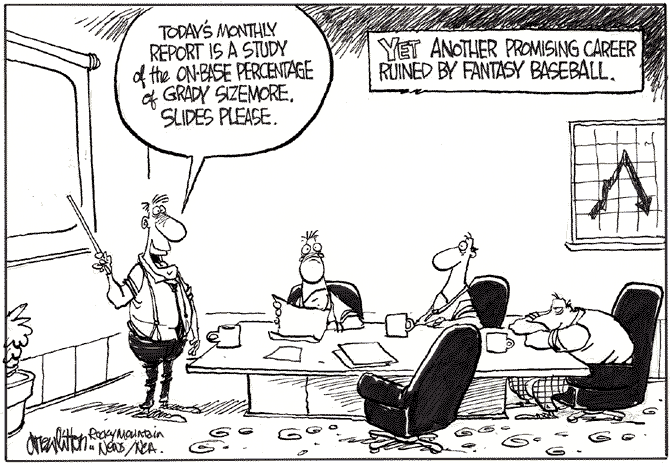
First up, I'd like to talk to you first on a subject that I'm sure hits home with at most if lucky 5% of this class, fantasy sports. You may be saying, what does this have to do with pop culture, to which I say, find a different blog to comment on.
Wikipedia defines fantasy sports as a game where participants act as owners to build a team that competes against other fantasy owners based on the statistics generated by the real individual players or teams of a professional sport. Probably the most common variant converts statistical performance into points that are compiled and totaled according to a roster selected by a manager that makes up a fantasy team. These point systems are typically simple enough to be manually calculated by a "league commissioner." More complex variants use computer modeling of actual games based on statistical input generated by professional sports. In fantasy sports there is the ability to trade, cut, and sign players, like a real sports owner.
This is strikingly similar to something we talked about recently in class: an imaginary social relationship. The difference here is that this imaginary social relationship is completely one-way, but completely dependent nonetheless. For example, if I own Peyton Manning on my fantasy football team, I am connected to how he performs, how many TD's he throws, how many yards, etc.
Although it was alive prior, the craze of fantasy sports took off during the rise of the internet in the mid-1990's. And it really took off. In 1999, it was discovered in a survey that 29.6 million people over the age of 18 take part in fantasy sports in the US alone.
The top two fantasy sports are football and baseball, with basketball and hockey coming up behind. My favorite sport is football, which could also be why I generally do the best in those leagues. And while it definitely helps having a good knowledge of the sport beforehand, there are plenty of guides in magazines, internet sites, tv shows, and more to lend you advice on how you should run your team. It's essentially an RPG where you are the owner and the professional players you draft are on your team. Although I don't think there are too many cases where fantasy football players fly across the country and live together... but who knows.

No comments:
Post a Comment